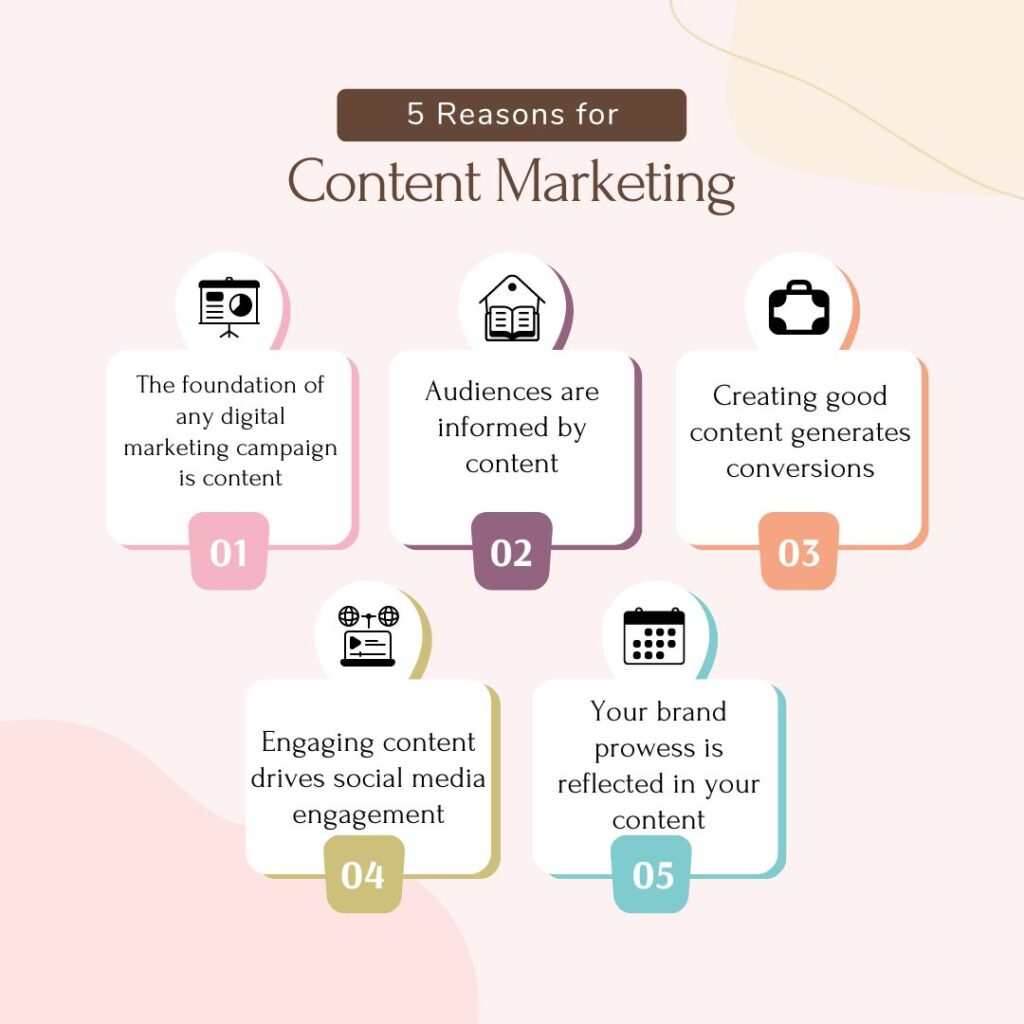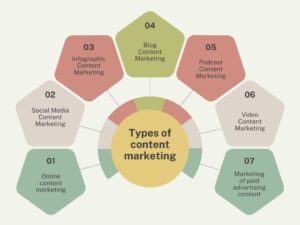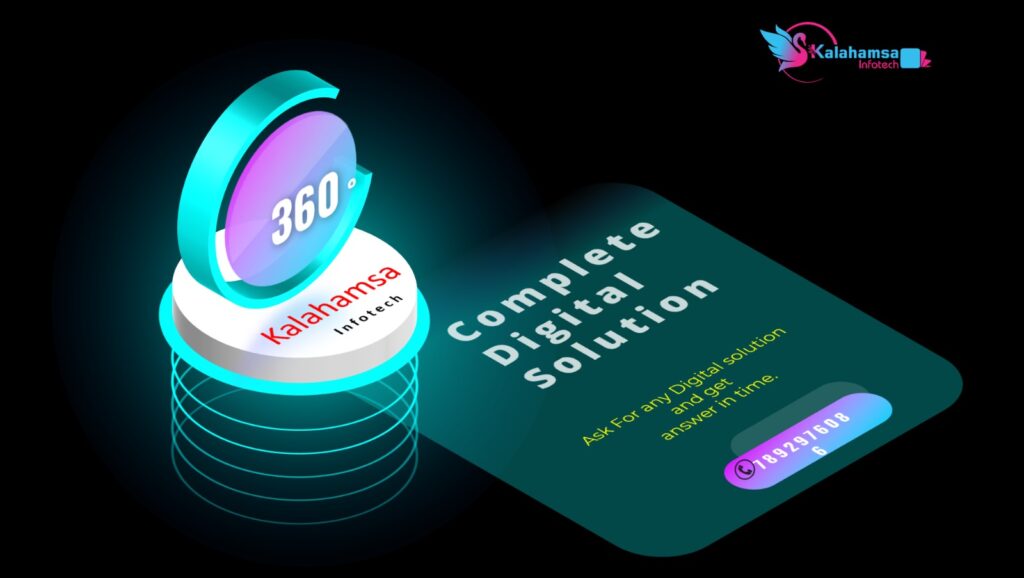The definition of content marketing is simple: It is the process of publishing written and visual material online with the goal of attracting more potential customers to your business. These can include blog posts, pages, eBooks, infographics, videos, and more.
However, content marketing is more than just posting a small piece of content and hoping that people will find it. It’s about deliberately tailoring your pages, videos, eBooks, and posts to your target audience so they find you through the inbound route rather than the outbound route.
Outbound marketing strategies today (or anything that disrupts your audience members) aren’t as effective at resonating with and converting your audience members as they once were.
Today, your content needs to reach your audience in a way that feels natural (i.e., incoming). A common way to do this is to create a narrative for your content, or tell a story. By doing so, your content will feel more authentic, engaging, and relevant to your audience.
A strategy is a plan of action designed to accomplish a long-term or overall goal. On the other hand, a digital marketing strategy involves a combination of planned activities carried out online to achieve a specific business objective. In other words, it means performing predictable activities at the right time through the most appropriate online channels to increase revenue and build relationships.
Why is content marketing important?
- Educate your leads and prospects about the products and services you offer
- Boost conversions
- Build relationships between your customers and business that result in increased loyalty
- Show your audience how your products and services solve their challenges
- Create a sense of community around your brand
5 reasons why you should use content marketing to boost your digital marketing strategy
Content marketing leads to business growth. Having content on your site gives people reasons to visit, learn, and become customers. You can’t attract visitors to your site without content. In this article, we’ll look at seven of the most important reasons for content.
- The foundation of any digital marketing campaign is content
A good content strategy is crucial if you intend to launch a digital marketing campaign. The reason for search engine optimization is the content of the pages that rank in the search results. PPC relies on content because it forms the landing pages that drive traffic to your ads.
The blog post you share on social media, the pages you optimize, and the words you use online to improve your reputation are content. No matter what you’re trying to accomplish, content is the foundation.
- Audiences are informed by content
Well-written content informs your audience about your business. A substantial portion of your potential customers have basic questions to answer. Creating content that informs your audience isn’t just about revealing fascinating facts; It helps them make the right purchase decision, makes their life easier, and gets you a good deal on their side. It is a win-win situation. A better-informed lead is more likely to become a paying customer, because they took the time to create the page!
- Creating good content generates conversions
Every time one of your visitors commits to becoming a customer of your site, this is considered a conversion. Conversions are what help your business grow. Posting your content is the first step to acquiring conversions, but once you’re there, you should attract as many new customers as possible.
- Engaging content drives social media engagement
Social media traction can be achieved by retargeting content. Along with your content, you can share relevant links and quotes, encouraging readers to share them on their online social media platforms. Further enhancing clarity by including powerful images or thoughts in your content allows users to share them on Twitter and Facebook.
Social media offers a direct line to customers that no other marketing channel can duplicate. You can engage your audience through posts, comments, and engagement and build an authentic relationship with your customer base. Direct input from genuine customers can be invaluable in creating and refining your marketing strategy. Your existing customers can promote your business through social sharing if you regularly create professional content.
- Your brand prowess is reflected in your content
You can showcase your brand, your business, and your expertise through the content you create. One of the reasons content marketing is effective is because of its wide range of channels. With a blog, video, podcast, white paper, eBook, or video, you can respond to a similar request from a customer.
It is impossible to apply one learning model to all situations. Some people prefer to read whether videos are available or not. Others prefer lectures or podcasts. Diversifying the visibility of your brand and your organization can improve your brand recognition and strengthen your position as a leader in your field.
Now let’s take a look at the different types of content marketing.
Types of content marketing
There are many types of content marketing that you can choose to incorporate into your strategy. Here are some of the most common:
- Online content marketing
Online content marketing refers to any material you post online, but specifically your web pages. A solid online content marketing strategy will help you rank higher in search engine results pages (SERPs) and get you in front of the right people at the right time.
HubSpot’s home page is an example of this, as it immediately engages visitors with specific content about our products.
- Social Media Content Marketing
With over 4.2 billion social media users worldwide, it’s easy to see why so many companies are investing in social media marketing. There are multiple platforms (eg Facebook, Instagram, Pinterest, LinkedIn, Snapchat) to work with and multiple ways to create and share content on each of them (eg photos, live videos, pre-recorded videos, stories).
- Infographic Content Marketing
Infographics display content, information, and data in an easy-to-understand graphic format. With a combination of simple wording, short statements, and clear images, infographics are a great way to communicate your content effectively. They work well if you are trying to distil an educational and/or complex topic so that all audience members can understand it.
- Blog Content Marketing
Blogs are a powerful type of inbound content and allow for great creativity in terms of purpose and topic. With a blog, you can do things like promote other internal and external content and blog posts via links, add social sharing buttons, and embed product information.
- Podcast Content Marketing
More than 60 million people listen to podcasts on the Spotify and Apple Podcasts platforms. For this reason, many companies and media have started to create and share their own podcasts.
Podcasts allow for a lot of creativity, as they can be about any topic you choose. In addition, it determines other factors related to the podcast, such as the frame rate of the episodes, who is on the podcast, where they announce the podcast, and the length of the episodes.
- Video Content Marketing
Video marketing can drive conversions, improve ROI, and help you build relationships with audience members. You can choose to share your video content on social media platforms, landing pages, or on a co-vendor’s website.
- Marketing of paid advertising content
Paid ads can help you reach large audiences and position yourself everywhere you want to be seen. Paid ads are especially beneficial when combined with inbound marketing. There are many places you can share paid ads, including social media, landing pages, banners, and sponsored content.
Next, let’s look at some examples of content marketing associated with the types of content marketing we just reviewed.
More: 5 Amazing Lead Generation Techniques for your Business






